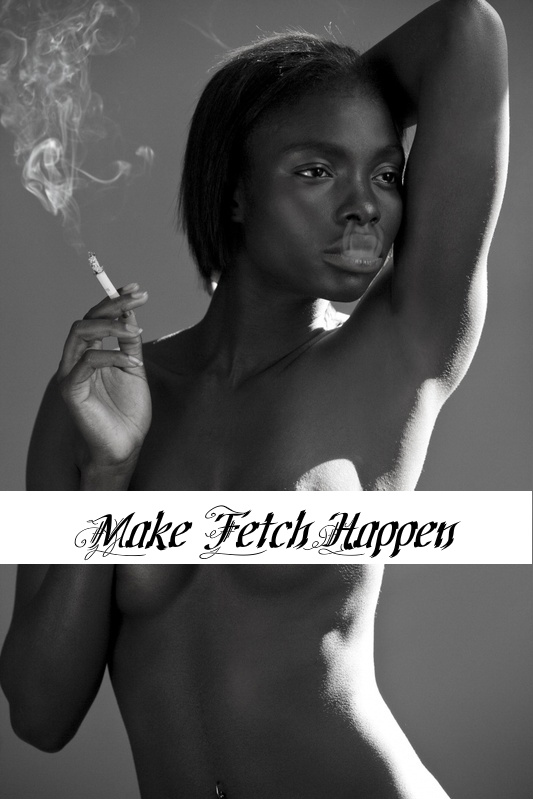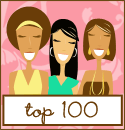 Photo: Models at Heatherette. When it comes to runways show it seems Blacks and Asians need not apply.
Photo: Models at Heatherette. When it comes to runways show it seems Blacks and Asians need not apply.There's a brief clip from BET's Fashion Blackout on Jezebel today. I finally watched the half hour special this evening and while it wasn't perfect, it was better than I expected from BET. I was hoping for a little more analysis from the likes of Vogue's Andre Leon Talley but microphone-shoved-in-face-at-fashion-show "interview" didn't really add to the topic.
Here is a rundown of the highlights for anyone who missed the show (please note that I've paraphrased many of the quotes here, my shorthand sucks and my toddler really wasn't into this show):
The show seems to have been shot during NY Fashion Week. The opening sequence is a melange of images from the runway and backstage. The voice over notes that, judging from models used at these show, "black is definitely out."
Runway stylist Kithe Brewster comes on and remarks that it is time to take a stand against this blatant discrimination. The stylist, who has worked for designers (Rubin Singer), actresses (Halle Berry) and on Project Runway, remarked that season after season the same people in charge only look for one or two black faces. Brewster made a point of hiring several black models for the Rubin Singer show and hopes that his actions will set an example for other designers.
One of the models he cast named Lily shared that because the Eastern European look is hot, that black models can't catch a break. Another model, Britnee said she was very aware during the show of how much she and the other black models stood out compared to the white ones. Model Ayan, shared that upon her arrival in New York for Fashion Week, she went to a couple agencies, one of which said that they "already have a black girl who looks like you." She retorted that the agency represented 150 white models who are styled in the exact same way and are working.
Popular designer Tracey Reese shared that she had to specifically request black models or the agency wouldn't send any to casting. "If black girls aren't going to castings, they won't get booked!" The top tier black models like Jordan Dunn and Chanel Iman are immediately booked for high end shows and Reese noted that she never gets the opportunity to hire them for her shows.
The voice-over adds that in 2008 Blacks are reaching unprecedented heights in the media industry but the fashion dinosaur lags behind the times.
Roman Young, the white Director of New Faces at Elite Models, said that fashion editors have told him quite explicitly not to send Black or Asian models to castings.
The voice-over notes that "black" style is pivotal to American culture.
Constance White, Style Director at Ebay and a former editor at ELLE, WWD, and The New York Times, recalls that Yves Saint Laurent and Givenchy once used many black models on their runways--superstars like Veronica Webb, Beverly Peele, and Yasmin--and that "we took it for granted [that they would alway be represented in shows.]"
Roman Young linked the downward spiral to the grunge movement in culture and fashion in the 90s. "Grunge was not ethnically diverse" and the fashion at the time started to reflect that. Also, when stylist began to become more prominent, color started fading from fashion. Andre Leon Talley noted that "sameness" became the rule.
Bethann Hardison shared that in her view, the "white eye" doesn't understand black beauty and if the new vanguard, European designers like Prada and Balenciaga, aren't using ethnic models then that discrimination will trickle down and become the norm.
Claude Grunitzky, Editor in Chief of Trace Magazine, puts the blame on the "three or four editors in Times Square" who dictate fashion for a living.
Somewhat echoing remarks made by Stefano Pilati, Bethann Hardison said quite bluntly (and inaccurately in my view) that "the body of a black girl" can't compete with that of an Eastern European model. "These people haven't eaten for generations (laughs)...generation-wise these people are very lean...that is why West African models get work now, because of their very narrow hips."
Model Lily comes on the screen to add that a new black model walking into a casting isn't viewed as a fresh face, she is viewed as the black model. They only see color.
Model Ayan notes that as black people we buy clothes from these same designers and yet they won't give us the chance to do a show. We are very beautiful people.
Voice-over comes on and states that black women spend $20 billion on apparel each year.
Kithe Brewster again: "We have to be conscious of our buying power - if you don't see yourself represented in their ads, don't buy their clothes."
Roman Young then shared this piece of information that made me want to put stiletto heeled boot in someone's ass:
[Agencies] are concerned with "am I picking the right one?" -- meaning the acceptable black model. They have used the term "bushy" to describe "African looking" black models. "She's so black and so severe that she must be The One." She looks so different that she must be beautiful.
Bethann Hardison shares that the fashion industry is a very exclusive almost elitist environment that has become "quite fascist right now."
She continues, adding that fashion is mainstream now and not a tiny island like it once was. It strikes a cord when people talk about this discrimination because this country has a history of fighting against such things and asking why is this happening? This is dumb.
Constance White adds that for a designer or editor to say that he or she would use a black model if they could find one "smacks at the heart of this whole issue of racism."
The show ends with highlights from the Sean John men's runway show in which he used all black models of diverse colors, looks and fits.
Hardison ends by noting that "we" need to do our part as well and adds that she is there ready to cultivate the talent.
Roll credits.






2 comments:
Are you aware of South African Elle magazine. Its been around for a few years now, but I can not seem to get my hands on it in the states. The magazine started with a blk editor and chief.It would be nice if we could get an Vogue Africa too.
I am aware of SA Elle but I'm a little hesitant to subscribe sight unseen, especially at $90+. I've never been able to find it in the States either.
Post a Comment